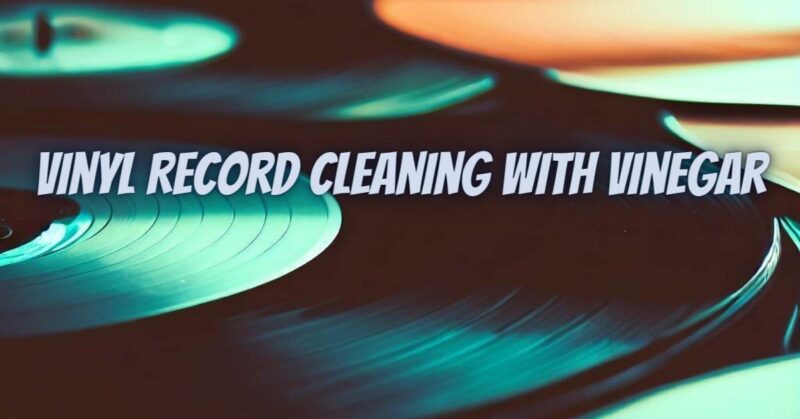Vinyl records, cherished for their warm analog sound, have experienced a resurgence in popularity in recent years. As vinyl enthusiasts seek to maintain their record collections, various methods and cleaning solutions are often discussed. One such method that has garnered attention is cleaning vinyl records with vinegar. In this comprehensive article, we will explore the use of vinegar for vinyl record cleaning, debunk myths, discuss potential risks, and provide guidance on safe and effective cleaning practices.
The Appeal of Using Vinegar
Vinegar has long been known for its cleaning properties and versatility. It’s an acidic solution that can effectively break down dirt, grime, and even mold, making it an appealing choice for those looking to clean their vinyl records at home. Additionally, vinegar is readily available, inexpensive, and seemingly eco-friendly, which adds to its appeal.
The Myth: Vinegar as a Vinyl Record Cleaning Solution
Myth: Vinegar Effectively Cleans Vinyl Records
The myth surrounding vinegar’s use for cleaning vinyl records claims that it can remove dirt, dust, and even mold from records, restoring them to their original condition. This myth has led many vinyl enthusiasts to consider vinegar as a cost-effective and accessible cleaning solution.
The Reality: The Risks and Potential Harm
While vinegar may appear to be a convenient cleaning option, especially given its reputation for cleaning other surfaces, it is not a suitable choice for vinyl records. Here are some key reasons why vinegar can be harmful to your records:
- Acidic Nature: Vinegar is an acidic solution, and vinyl is a sensitive material. When vinegar comes into contact with vinyl records, it can lead to chemical reactions that damage the vinyl itself. This damage may manifest as pitting, warping, or other irreversible effects that impact playback quality.
- Residue: Improper use of vinegar can leave behind a sticky residue on the record’s surface. This residue can attract dust and dirt, which not only affects audio quality but also interferes with the stylus during playback.
- Label Damage: If vinegar spills onto the label of a vinyl record, it can cause the ink or paper to deteriorate, potentially damaging the label.
Safe and Effective Vinyl Record Cleaning Practices
To properly care for your vinyl records and maintain their pristine condition, it is essential to adopt safe and effective cleaning practices:
- Anti-Static Brush: Invest in an anti-static brush designed for vinyl records. Use it to gently remove surface dust and debris from your records before playing them.
- Carbon Fiber Brush: For deeper cleaning, use a carbon fiber brush to clean the grooves of your records. These brushes are specifically designed to dislodge and remove fine particles without causing harm.
- Dedicated Cleaning Solution: Consider using a dedicated vinyl record cleaning solution. These solutions are formulated to safely and effectively remove contaminants without damaging the vinyl. Apply the solution with a soft, lint-free cloth or a dedicated record cleaning brush.
- Record Cleaning Machines: For serious collectors, record cleaning machines offer a thorough and effective cleaning method. These machines use a combination of cleaning solutions and brushes to deep-clean records.
- Proper Storage: Prevent dust and dirt buildup by storing your records upright in polyethylene or polypropylene sleeves. Keep them in a cool, dry, and dust-free environment.
- Handle Records Carefully: Always handle records by the edges or the label to avoid transferring oils and dirt from your fingers onto the grooves.
Seeking Professional Help
If you have valuable or rare vinyl records that require deep cleaning or restoration, it is advisable to seek professional cleaning services. Professionals have access to specialized equipment and expertise to safely and effectively clean and restore records without causing harm.
While vinegar has its place in household cleaning, it is not a suitable solution for cleaning vinyl records. The potential risks of damaging the vinyl and leaving residue far outweigh any perceived benefits. To care for your vinyl records properly and ensure their longevity, invest in dedicated cleaning tools and solutions, and follow best practices. By doing so, you can enjoy your cherished music collection for years to come without compromising its quality.


